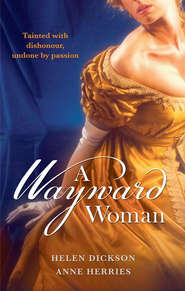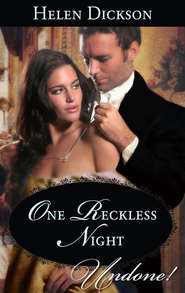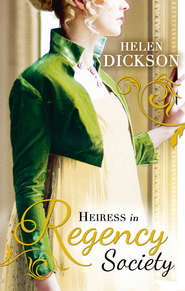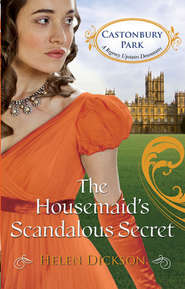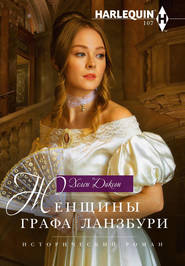По всем вопросам обращайтесь на: info@litportal.ru
(©) 2003-2025.
✖
Rogue in the Regency Ballroom: Rogue's Widow, Gentleman's Wife / A Scoundrel of Consequence
Настройки чтения
Размер шрифта
Высота строк
Поля
Wishing the prisoners would walk faster so that they could move on, Amanda looked at the man Mrs Hewitt pointed out with scant interest, and then with a growing curiosity. She hardly noticed anyone else—her attention was entirely focused on him. With his mouth set in a thin, hard line, he walked with his head held high, with a kind of arrogance, which, in the midst of so much wretchedness that clung to his fellow prisoners, had its own kind of greatness. She could see that his clothes were of fine quality, but badly stained. The rags of his once-white shirt gave little protection to his broad shoulders and bronzed skin, which showed through in many places, but he did not seem conscious of the hot sun. His overwhelming masculinity stirred some deeply rooted feminine instinct that she acknowledged.
‘What did he do?’
Mrs Hewitt turned to look at her, plying her fan with verve. ‘Why, don’t you remember? He’s the man who killed poor Carmen Rider.’
Amanda recalled the scandal that had torn through Charleston. The town had reeled with horrified fascination of the murder. Carmen was a thirty-year-old wealthy widow, a Spanish woman, who had been brutally murdered in her home two months or so ago. It was her maid who had found her. The room had been ransacked and she had died from vicious wounds, having clearly put up a fierce struggle against her attacker.
‘I was in Savannah with Aunt Lucy, visiting her sister-in-law at the time, so I do not know the details of the case.’ Besides, she thought, she had been enjoying the delightful company of some of the charming bucks belonging to Savannah’s elite too much to dwell on a depressing murder case taking place in Charleston. ‘What do you know about Mr Claybourne, Mrs Hewitt?’
‘Not much, only that he lived out of town—in a wooden cabin in the cypress swamp—by the river. Bit of a loner, if you ask me. At one time he spent some time in the Smoky Mountains—with the Indians, some say, where he improved his skill with horses. Carmen hired him to break in some of her mounts. Since her husband died she had had a host of admirers but she quite shamelessly threw herself at Mr Claybourne—proclaiming her love for the man to anyone who would care to listen. From what I’ve heard he was not as enamoured of her as she was of him, but he stayed anyway. Whether or not they had a full-blown affair is open to speculation.’
‘He might have fared better had he stayed in the swamp with the alligators,’ Amanda murmured. ‘I seem to recall there are Claybournes in England—aristocrats, I believe.’
‘As to that I wouldn’t know, but I shouldn’t think there is any connection. I cannot see a peer of the realm coming to America to work with horses.’
‘No, I suppose not. Why do you think he killed her?’
‘It was known that they quarrelled and he left her the day before she was killed. When she was found, it was believed that he was the murderer—her brother was certain of it, though he’s a rogue if ever there was. There are those who know Mr Claybourne that say his behaviour was most out of character, that he is a man of considerable intelligence, and that a man of that stamp does not commit such acts of madness without good reason. But everything seemed to point to him. He was the prime suspect and arrested and taken to gaol.’
‘Was there no one else who could have killed her?’
‘Opinion was unanimous that he was the only one with a motive strong enough, and in a final quarrel he murdered her. Owing to the seriousness of the case and the social prominence of Carmen—her husband was a well-known and respected attorney in Charleston, you know—the jury found him guilty and he was sentenced to hang.’
‘And what did Mr Claybourne have to say for himself?’
‘All the time he stuck to his statement that he was nowhere near her home at the time—and there were many who believed him innocent but none who could substantiate his alibi. The servants gave accounts of constant discord between their mistress and Mr Claybourne and testified that a man of his description let himself into the house and went to Carmen’s room on the night she was killed.’
As Mr Claybourne passed in front of the carriage, Amanda was aware of the tension and nervousness in herself. He was close enough now for her to see his face more clearly. Beneath his facial growth she could see he was attractive. His jaw was roughly carved, his forehead was high, his eyebrows heavy, his cheeks lean and his hair, though dull and lank, was thick and dark brown.
As if he felt her scrutiny, he turned and met her eyes. She knew instinctively that he was just as aware of her as she was of him. Her heart skipped a beat as she met those eyes steadily, and she saw amber flames ignite within their depths.
His eyes assessed her frankly, taking in her cool, quiet beauty. She was vividly conscious of him, and she felt the unfamiliar rush of blood humming through her veins, which she had never experienced before. Instantly she felt resentful towards him. He had made too much of an impact on her, and she was afraid that if he looked at her much longer he would read her thoughts with those clever eyes of his.
And then he was gone, oblivious to the cane which at that instant the guard thudded on to his back. Amanda watched the convicts become swallowed up by the crowd, her eyes fixed on the tall man until the last.
‘When will the sentence be carried out?’ she asked Mrs Hewitt.
‘In about a week.’
When the congestion began to clear, and after bidding Mrs Hewitt farewell, all the way to Magnolia Grove Amanda turned her thoughts once more to her predicament, trying to find a way to circumvent her father. There must be some way to escape marrying a man of his choosing, there must be something she could do. And then the words of Nan came back to her—that perhaps she should marry a senile old man who wouldn’t last the year.
Nan was right—but instead of a man in his dotage, why not a man who was to end his life on the gallows one week hence, a man with the name of Claybourne who could well be a relative of the aristocratic Claybournes in England? Then she could go home and truthfully tell her father she was a widow—whilst keeping the manner of her husband’s death to herself—and he would have no choice but to respect a year of mourning. By then she would be twenty-one and independent of him.
But suppose he wouldn’t marry her? Suppose, despite all her promises of enough food and comforts to make his last days bearable, he still refused to marry her? Then what would she do?
Amanda clenched her hands, her eyes taking on a determined gleam. I’ll make him marry me. I’ll make him want to marry me, she vowed, with the goad of desperation. Headstrong and tempestuous, she was so accustomed to having her own way that she did not pause to consider that any other way might exist.
She wasn’t fool enough to think it would be easy. She would have to evaluate various approaches. Somehow she would have to prevent Mr Quinn from finding out what she was about to do until it was too late for him to do anything about it. He had been in her father’s employ for many years, and when she had come to America her father had insisted that Mr Quinn act as her guardian, giving him the authorisation to vet the suitability of the man she might want to marry—her father being of the opinion that, as a mere girl, how could she possibly tell a true gentleman from a rogue? Her only hope was Amos. Amos was an important man at Magnolia Grove; he knew everything there was to know about Charleston, and he could be relied on for his discretion.
Sheltered by massive oaks, palmetto and shimmering beech trees, Magnolia Grove stood on the outskirts of Charleston, basking in the sun like a jewel. It was a house of considerable proportions. Shaded arches, brightened by cascades of blood-purple bougainvillea, yellow cassia and the scarlet cry of frangipani, supported a first-floor gallery that stretched the full length of the house. It was surrounded by an array of formal gardens meticulously sculpted, with statues that stood in their own beds of flowers. The house was spacious and light inside, the furnishings simple yet tasteful.
Aunt Lucy’s husband, Edward Cummings, who had died shortly after the Civil War, had been a brilliant businessman. He had made his fortune trading rum, sugar, rice and cotton. A financier of blockade runners during the Civil War, he was one of the few people in Charleston who had not gone under and had kept his grand town house, although following the devastation of the war and with the emancipation of the slaves, he had been forced to sell his cotton plantation on the Cooper River.
Amanda had soon become accustomed to the rhythm of life at Magnolia Grove and the bustle of servants. Having grown extremely fond of Aunt Lucy in the twelve months she had been in Charleston, her sudden death had affected Amanda profoundly and she missed her terribly. Charlotte, Aunt Lucy’s only child, and her husband, Mark, had taken care of all the formalities. Unable to bear the thought of selling the old family home, Charlotte and her husband had decided to leave Atlanta in Georgia and make Magnolia Grove their own.
On entering the house, Amanda found Charlotte arranging fragrant white roses in a glass vase on a circular rosewood table in the centre of the hall. She turned to look at Amanda and smiled.
‘Ah, you’re back! How was your visit to the shops?’
‘Fruitful,’ Amanda replied, indicating the packages Nan was carrying, ‘though terribly hot. Can I help?’ she asked, removing her bonnet and leaving Nan to take her burden up to her room.
‘Thank you, but I’m almost done.’ Adding the final rose into her arrangement, Charlotte stood back to survey her handiwork, a wistful expression on her face. ‘These roses were Mother’s favourites. She grew them herself—had them sent out from England.’
‘I know,’ Amanda said quietly, remembering how Aunt Lucy had patiently shown her how to prune them. ‘I’m sorry she’s no longer with us. The house isn’t the same without her.’
‘I take comfort knowing she’s with Father now, that she will be content. She always believed in heaven and an eternal life, so I have no doubt that that is where she will be.’ Charlotte put out a hand and touched Amanda’s arm affectionately. ‘Mother grew very fond of you, Amanda. She was so happy when you came to stay with her.’
Charlotte, a quiet, tolerant being, was a petite, rosy-cheeked brunette and eight years older than Amanda. Her grief, Amanda thought, made her look pretty. She had the sort of kind, caring face that didn’t need smiles to enhance it.
‘I wish you didn’t have to go back to England,’ Charlotte said, ‘but I know you must. Still, you can always come again. I do hope so.’
‘If it was anyone else other than Father telling me I must go home, I wouldn’t leave—and I’m so glad you’ve decided to live here. It wouldn’t seem right to part with this lovely old house, for strangers to move in. What about Mark? Will he miss Atlanta?’
‘He’s looking forward to it, and already seeking premises to set up his law practice. He was born in Charleston. He’s always wanted to come back.’
‘I can understand why. I’ve grown terribly fond of Charleston myself.’
‘But you miss your father.’
‘Of course I do. I love him dearly and I’m so proud of what he’s accomplished throughout his life—not many men could have achieved what he has unaided—but how I wish he wouldn’t press me so hard to wed. Why is it that men should think that marriage should be every woman’s goal in life?’
‘When you return to England, perhaps he’ll be so happy to have you back in the fold and realise just how much he’s missed you that it will no longer seem important to him.’
‘Oh, no, Charlotte. In this his mind is made up. In the matter of my marrying he will have his way. He grows impatient. By the time I get home he will have endeavoured to find a husband for me. In fact, I think it’s safe to say he will have gone to extraordinary lengths to accomplish that.’
‘It could have been different, you know,’ Charlotte said gently and without reproach. ‘As soon as Mama launched you on to South Carolina’s social scene you became an instant success, with offers for your hand made in record numbers.’
This was true; no matter what event Amanda attended, she was always the belle of the ball. Immediately she was surrounded by a crowd of besotted swains and in no time at all had them eating out of her hand. Impulsive, witty and intelligent—and with a zest for life that left Charlotte breathless—Amanda was desired by all and, with her pink cheeks and lush deep-red hair, she glowed like a jewel against white silk. But her popularity wasn’t due primarily to her loveliness and wit, or to the fact that she was heiress to a huge fortune; it was because she kept so much of herself hidden that no one really knew the true Amanda. She possessed an aura of pride that warned a man not to come too close. She had become an exciting enigma that intrigued everyone who met her.
‘If you had chosen one of them, and the formidable Mr Quinn approved, then he would have been returning to England alone.’
Amanda sighed, bending over the table to smell the roses. ‘It’s my own fault, I know. Most of the men of marriageable age I found amusing and charming enough, but there hasn’t been one that inspired anything stronger than that—and certainly not one I would choose to spend the rest of my life with. Besides, I know the true reason why they seek my company. The contact isn’t friendship, so it has to be that they are drawn by the smell of power and money.’
She became despondent. ‘I suppose, if I’m honest, I don’t want to get married to anyone, because all the pleasures I enjoy so much will be denied me with a husband in tow. Since coming to Charleston I’ve had a wonderful time. Everyone has been so friendly, hospitable and courteous. I’ve been invited everywhere—to parties and picnics. I don’t want it to end, Charlotte. Where is he, by the way?’ she asked, straightening up and doing a quick sweep of the hall, half-expecting her formidable guardian to materialise from one of the rooms leading off.
‘Who—Mr Quinn? I have no idea. He comes and goes as he pleases. Of late he’s been noticeably quiet—as if something weighs heavy on his mind. In fact, he really is a man of mystery and many secrets. I do wonder what he finds to do half the time. Come, we’ll go and sit on the porch. It’s the one place that offers a cool and shady place to sit and chat. I’ll just go and find one of the servants and have them bring us some lemonade.’
‘Let me go—there’s something I wish to speak to Amos about.’ For a moment Amanda felt regret that she was about to deceive her cousin, but it was gone as soon as she saw Aunt Lucy’s old retainer crossing the yard to the stables. Amos had been a part of the Cummings family for years, and with a great sense of pride and full of his own importance, he lorded it over all the other servants and could galvanise the most shiftless into action. Aunt Lucy had come to depend on him a great deal since the death of her husband, and she had always said how he was her mainstay, and that his loyalty was something money couldn’t buy.







